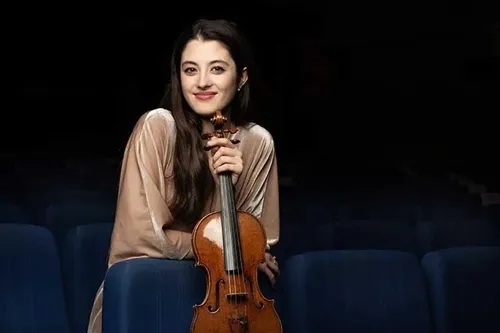
Musicologist and writer Donald Tovey once expressed his admiration for Beethoven's Violin Concerto in D major, Op. 61, stating that its most remarkable moments of genius are not only filled with mysterious tranquility but also shrouded in radiant happiness. María Dueñas' interpretation of this piece in her latest two-CD collection, Beethoven and Beyond (Deutsche Grammophon), truly embodies this sentiment. She skillfully extends trills to seemingly impossible lengths and gracefully decelerates midway through the first movement, leading into the grand striding triplets. With daring risks and the full support of the orchestra and conductor, Dueñas leaves ample space for Beethoven's luminous musical expressions, resulting in a triumphant performance.
This album, available in both CD and vinyl formats, includes additional short works by Kreisler, Saint-Saëns, Spohr (featuring a beautiful G major Adagio with harp), Wieniawski, and Ysaÿe. The companion disc showcases cadenzas by the same composers for the first movement of Beethoven's concerto. Dueñas performs her own cadenzas on the recording, which are impressively extensive in the first movement and exquisitely captivating at times in the third.
Born in Granada, Spain, Dueñas, who is now 20 years old, has been studying under Boris Kuschnir at the Music and Arts University of Vienna since 2016. Her accomplishments include winning the first prize and audience prize at the 2021 Menuhin Competition in Richmond, as well as triumphing at the Viktor Tretyakov International Violin Competition in Krasnoyarsk and the 2018 Vladimir Spivakov International Violin Competition in Ufa. Currently, she performs on the 1710 "Camposelice" Stradivari violin, generously provided by the Nippon Music Foundation.
In a video interview, Dueñas reveals that the Beethoven Violin Concerto has played a significant role at pivotal moments in her career. It was the last concerto she performed before the pandemic and the first one she played afterward. She fondly recalls a particularly special concert in her hometown of Granada. Dueñas reflects on how the pieces learned in youth remain ingrained in one's fingers and mind indefinitely. Initially, she began learning the concerto purely for enjoyment, only later approaching it with greater dedication while living in Germany. When she performed it for Marek Janowski, the chief conductor of the Dresden Philharmonic, and inquired about playing it with his orchestra, he responded, "When you're 18." At that time, she was just 11 years old. This became a personal goal for Dueñas—to reach a level of skill that would allow her to perform Beethoven's concerto with Janowski.
Dueñas' profound understanding of the Beethoven Concerto also proved valuable during a spontaneous meeting earlier this year at the Golden Hall of the Musikverein in Vienna with renowned conductor Herbert Blomstedt, who is 95 years old. She describes this as another instance where Beethoven came to her aid. Dueñas performed the concerto without any accompaniment, not even a piano since the meeting was unexpected and arranged last minute. She simply took the stage in the empty hall and played Beethoven for Blomstedt. When asked if the maestro conducted, she smiles and replies, "No, he merely listened. It's a shame we didn't have an orchestra. However, afterward, I believe he was very happy and impressed. He promptly invited me to the concert in Dresden." At the time of writing, Dueñas is scheduled to perform the Mendelssohn Concerto with Blomstedt conducting the Chamber Orchestra of Europe at the Dresden Music Festival in May.
In her pursuit of a musical career, Dueñas aspires to emulate her childhood idols: Oistrakh and Heifetz. She admires their distinct personal sound, which she can recognize when listening to their recordings. From the beginning, Dueñas knew she wanted to achieve her own unique sound, one that audiences would readily identify. She notes that working with conductor-violinists like Manfred Honeck, the music director of the Pittsburgh Symphony Orchestra, makes a significant difference in most cases. Such conductors possess a deep understanding of the violin and can genuinely comprehend the performer's intentions, following their lead. Maestro Honeck was one of the first conductors who believed in Dueñas when she was very young, inviting her to Pittsburgh and offering substantial support. She considers him not only a remarkable conductor but also a wonderful person, creating a remarkable synergy when they collaborate and exchange ideas about the music they perform together.
Dueñas' affinity for cadenzas is evident in her album Beethoven and Beyond, reflecting her passion for history and musical authenticity. She believes that when composers grant the opportunity to create one's own cadenzas for their magnificent concertos, it should be embraced. The first time she performed the Beethoven Concerto, she composed her own cadenzas. Since then, she has written cadenzas for all concertos that allow for such personal interpretation. Her cadenza-writing journey began with Mozart's concertos, followed by Beethoven and Brahms.



